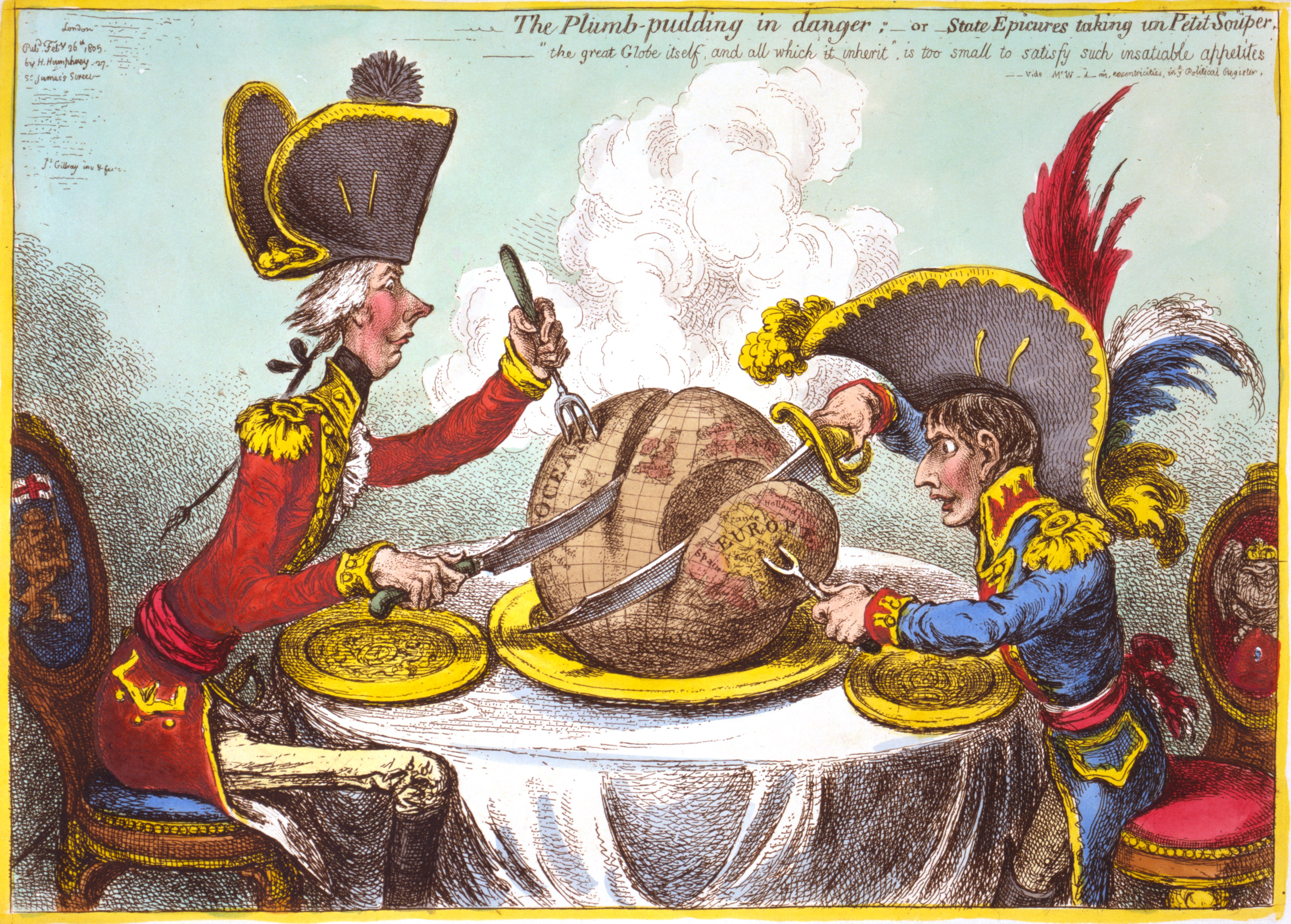More languages
More actions
m (Links) Tag: Visual edit |
(Statistics) Tag: Visual edit |
||
| Line 1: | Line 1: | ||
[[File:French_and_British_colonialism_cartoon.jpg|alt=|thumb|An 1805 cartoon depicting French and English colonialism of the globe.]] | [[File:French_and_British_colonialism_cartoon.jpg|alt=|thumb|An 1805 cartoon depicting [[French Empire (1804–1815)|French]] and [[United Kingdom of Great Britain and Ireland (1801–1922)|English]] colonialism of the globe.]] | ||
'''Colonialism''' is the policy of a country seeking to extend or retain its authority over other people or territories, generally with the aim of economic dominance.<ref>''Webster's Encyclopedic Unabridged Dictionary of the English Language'', 1989, p. 291.</ref> [[Marxism]] views colonialism as a form of [[capitalism]], enforcing exploitation and social change. [[Karl Marx|Marx]] thought that working within the global capitalist system, colonialism is closely associated with uneven development. It is an "instrument of wholesale destruction, dependency and systematic exploitation producing distorted economies, socio-psychological disorientation, massive [[poverty]] and [[Neocolonialism|neocolonial]] dependency".<ref>Watts, Michael (2005). "colonialism, history of". In Forsyth, Tim (ed.). ''Encyclopedia of International Development''. Routledge. [[ISBN (identifier)|ISBN]] [[Special:BookSources/9781136952913|<bdi>9781136952913</bdi>]].</ref> | '''Colonialism''' is the policy of a country seeking to extend or retain its authority over other people or territories, generally with the aim of economic dominance.<ref>''Webster's Encyclopedic Unabridged Dictionary of the English Language'', 1989, p. 291.</ref> [[Marxism]] views colonialism as a form of [[capitalism]], enforcing exploitation and social change. [[Karl Marx|Marx]] thought that working within the global capitalist system, colonialism is closely associated with uneven development. It is an "instrument of wholesale destruction, dependency and systematic exploitation producing distorted economies, socio-psychological disorientation, massive [[poverty]] and [[Neocolonialism|neocolonial]] dependency".<ref>Watts, Michael (2005). "colonialism, history of". In Forsyth, Tim (ed.). ''Encyclopedia of International Development''. Routledge. [[ISBN (identifier)|ISBN]] [[Special:BookSources/9781136952913|<bdi>9781136952913</bdi>]].</ref> | ||
Colonies are typically forced into specific modes of production by their colonial rulers. The search for raw materials and the current search for new investment opportunities is a result of inter-capitalist rivalry for capital accumulation. [[Vladimir Lenin|Lenin]] regarded colonialism as the root cause of [[imperialism]], as imperialism was distinguished by monopoly capitalism at a global scale | Colonies are typically forced into specific modes of production by their colonial rulers. The search for raw materials and the current search for new investment opportunities is a result of inter-capitalist rivalry for capital accumulation. [[Vladimir Lenin|Lenin]] regarded colonialism as the root cause of [[imperialism]], as imperialism was distinguished by monopoly capitalism at a global scale | ||
== European colonialism == | |||
Between 1860 and 1899, the [[United Kingdom of Great Britain and Northern Ireland|British]] colonial empire grew from 2.5 to 9.3 million square miles and 126.4 million to 309 million inhabitants. During the same time, the [[French Republic (1870–1940)|French]] colonial population grew from 3.4 to 56.4 million, and [[German Empire (1871–1918)|Germany]] formed a colonial empire that subjugated 14.7 million. | |||
Between 1876 and 1900, the percentage of land under [[United States of America|U.S.]] or [[Europe|European]] colonial rule rose from 10.8% to 90.4% in [[Africa]], 56.8% to 98.9% in [[Polynesia]], and 51.5% to 56.6% in [[Asia]]. In addition to the previously mentioned countries, [[Kingdom of Belgium|Belgium]] and [[Kingdom of Portugal (1139–1910)|Portugal]] had colonial empires with 30 million and nine million inhabitants, respectively.<ref>{{Citation|author=[[Vladimir Lenin]]|year=1916|title=Imperialism, the Highest Stage of Capitalism|chapter=Division of the World among the Great Powers|chapter-url=https://www.marxists.org/archive/lenin/works/1916/imp-hsc/ch06.htm|city=[[Moscow]]|publisher=Progress Publishers|mia=https://www.marxists.org/archive/lenin/works/1916/imp-hsc/index.htm}}</ref> | |||
== See also == | == See also == | ||
Revision as of 23:42, 11 June 2023

Colonialism is the policy of a country seeking to extend or retain its authority over other people or territories, generally with the aim of economic dominance.[1] Marxism views colonialism as a form of capitalism, enforcing exploitation and social change. Marx thought that working within the global capitalist system, colonialism is closely associated with uneven development. It is an "instrument of wholesale destruction, dependency and systematic exploitation producing distorted economies, socio-psychological disorientation, massive poverty and neocolonial dependency".[2]
Colonies are typically forced into specific modes of production by their colonial rulers. The search for raw materials and the current search for new investment opportunities is a result of inter-capitalist rivalry for capital accumulation. Lenin regarded colonialism as the root cause of imperialism, as imperialism was distinguished by monopoly capitalism at a global scale
European colonialism
Between 1860 and 1899, the British colonial empire grew from 2.5 to 9.3 million square miles and 126.4 million to 309 million inhabitants. During the same time, the French colonial population grew from 3.4 to 56.4 million, and Germany formed a colonial empire that subjugated 14.7 million.
Between 1876 and 1900, the percentage of land under U.S. or European colonial rule rose from 10.8% to 90.4% in Africa, 56.8% to 98.9% in Polynesia, and 51.5% to 56.6% in Asia. In addition to the previously mentioned countries, Belgium and Portugal had colonial empires with 30 million and nine million inhabitants, respectively.[3]
See also
References
- ↑ Webster's Encyclopedic Unabridged Dictionary of the English Language, 1989, p. 291.
- ↑ Watts, Michael (2005). "colonialism, history of". In Forsyth, Tim (ed.). Encyclopedia of International Development. Routledge. ISBN 9781136952913.
- ↑ Vladimir Lenin (1916). Imperialism, the Highest Stage of Capitalism: 'Division of the World among the Great Powers'. Moscow: Progress Publishers. [MIA]
